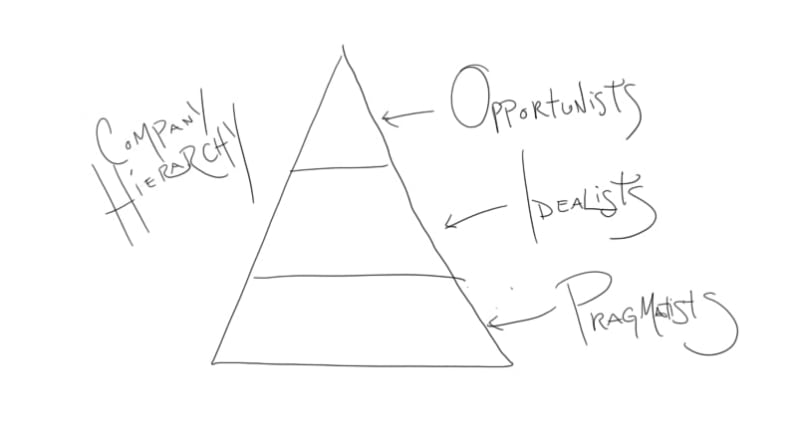I originally posted this on my blog about two years ago. If it's interesting to you, I post new content on daedtech.com roughly weekly.
Ah, the exit interview.
If you've had this experience, the first one probably arose in confusing fashion. You put in your notice and the team scheduled your goodbye lunch. At someone point, HR put a meeting request on your calendar that prompted you to say, "an exit what -- what is this?"
And then you had an exit interview.
Or, maybe you've never had this awkward experience at all so far in your career.
Whether you're an exit interview veteran or googling it for the first time, though, I've got some pointers for how to handle this. I've given general advice on whether to quit a job and how to quit a job before, but this will be specific to the exit interview portion of quitting.
What Is an Exit Interview?
First things first. What actually is an exit interview?
It's not the most naturally intuitive concept, but you can probably infer what it involves from its name. Still, you might wonder, "what's the point?"
An exit interview is a meeting that someone, usually the HR department at a decent sized company, schedules with you. It'll generally happen the day of or the day before your departure, and it'll take half an hour or maybe an hour if they really want to cover a lot of ground.
They'll ask you a lot of questions, effectively looking for a private, Glassdoor-style review of the company. For instance, here are some blue chip exit interview questions.
- Why are you leaving?
- What did you like most about working here? Least?
- How was it working with your manager and your coworkers?
- Did you have what you needed to do your job effectively?
- How could your manager improve? How could the company?
You get the idea.
The exit interview is a standard practice for the company to collect and, hopefully, incorporate feedback from departing employees. Theoretically, it offers them a unique window into people's real thoughts about the company, since they can speak freely and without consequence.
Theoretically.
How People Handle These Things
In a post I refer to often, I define the corporate hierarchy and the people who occupy it.
There's a lot of subtlety to the particulars about the archetypes, but I'll give a really quick overview.
- Pragmatists are your workaday folks that "work to live" and don't have serious designs on climbing the corporate ladder. In the programming world, this includes a layer that I call "journeyman idealists."
- Idealists really believe in the company they work for, generally over-performing in the hopes of climbing the ladder. They move up, but in limited fashion.
- Opportunists have the secret to rapid corporate ascension.
Bearing that in mind, let's look at how each of these archetypes handle the exit interview.
- Pragmatists view this as the first (and last) time they'll ever really have any leverage regarding their company and act according to their personalities. Some will be tactful and some checked out. Others will gleefully badmouth the company and attempt to settle scores.
- Idealists get extremely engrossed in the company narrative in general and will approach the exit interview the way spouses approach a divorce conversation. Lots of emotional feedback and the general operating assumption that their feedback will matter.
- Opportunists? Well, opportunists do something else altogether. And that's what I'm encouraging you to do.
Opportunists and the Exit Interview
Opportunists have a game plan for this occasion. Most of them probably hatch the plan subconsciously, without really sitting and preparing in any way.
But some might take an overt approach. In either case, they have the same game plan.
Pretend that the current job is the second best thing that ever happened to them, second only to the job they're taking.
They might hate the current job. They may also hate their managers, coworkers, and everything else right on down to the coffee in the breakroom.
But HR won't hear anything about that.
The exit interview will be a highly pleasant and superficial affair. Oh, sure, they'll concede very minor shortcomings -- they won't want to lay it on too thick and seem insulting. Just cheerily cooperative and superficial.
HR: Why are you leaving us?
Opportunist: It wasn't an easy decision, but I just have an opportunity too good to pass up.
HR: What was the best part about working here?
Opportunist: It's hard to know where to start. I liked the...
HR: What didn't you like about working here?
Opportunist: Honestly, everything was pretty great. I guess some of the pockets of overtime dragged on me a bit, but that's gonna happen anywhere. It's really hard to think of anything.
And so on.
What's the Rationale?
Why does the the opportunist do this? It's a pretty simple expected value calculation, reminiscent of a corporate version of Pascal's wager.
There's really no upside to honesty, as far as the opportunist is concerned. The company consists of a bunch of humans about whom the opportunist is to provide feedback. Provide good feedback and those people will remember the good things said about them. Provide negative feedback and the opposite is true.
All of those people will continue to play out their careers, staying at that company or moving on to others. And, at some point, they may be in a position to help the opportunist out in some way. So why not make sure they have every reason to do so?
Even people with whom the opportunist vehemently disagreed or had stylistic clashes may relent in retrospect. A problematic manager or coworker might expect negative feedback and be pleasantly surprised (and probably confused) to receive positive. In a subtle sense, the opportunist creates a favor owed.
But That's Not Right -- Think of the Company!
I can hear people objecting to this. (And I've heard the objections discussing this over beers.)
- HR folks hate this. "If you don't tell us, how can we do our part to improve the culture?"
- Some people have a populist objection. "It's your chance to make a difference for your friends and colleagues there."
- And others have a broader populist objection. These are the people that take their duty to rate purchases on Amazon very seriously. "It's your duty to provide feedback to help people working there now and people who might work there later."
Let me answer this in two ways. First, pragmatically, and second philosophically.
Pragmatically speaking, reverse the roles and imperatives. What HR and others are saying to you is, "you should incur some risk to your career prospects as a favor to the company and to other people."
But would (and did) the company do this for you? You're leaving for a reason.
Did the company take a slight amount of risk to do you the favor of paying you more, giving you better assignments, or whatever prompted you to leave? Nope.
More philosophically, opportunists understand the corporate game and they do something the other archetypes don't. They ignore the idea of "the company" altogether.
Pragmatists view the company as sort of a parental figure and idealists view it as a steward of their careers. Opportunists realize that the company and its culture don't matter and that companies are just complex collections of individual relationships.
Viewed through that lens, the honest exit interview is absurd and just amounts to gossiping on the record about potential future business relationships.
Go Forward with Clear Conscience
I talk a lot more about these concepts in my book, Developer Hegemony. Embracing the opportunist outlook tends to create crises of ethics in career-minded people.
But this particular opportunist play doesn't expose you to that. It's a perfectly reasonable thing to do.
Do you really think you're going to tell the HR people anything they haven't heard and aren't aware of? Do you really think what you say will translate into actionable... anything?
Like the performance review, the exit interview seems a good idea in theory, but it's really mainly an ignored formality. People go through the motions.
You've already taken a major step toward looking after your own interest. So don't stumble on this relatively minor one.
Preserve all relationships that you currently have and maximize your future interests. This will put you on the pathway to realizing meaningful organizational authority in your career, rather than pretending at it during extremely temporary moments of leverage.
If you'd like to ask a reader question, you can do so at the "ask me" page.







Top comments (13)
What about "It was great working here and I enjoyed the culture and people and if you are interested in my thoughts on how to make it better I would be happy to discuss being a part time consultant at thrice my prior hourly rate"?
:D
I wish there were a unicorn reaction for comments :D
Or to rephrase "don't burn bridges in your exit interview". I have mixed feelings on this. Its a very pessimistic view. If you are leaving because they truly treated you poorly, you may think you owe them nothing and they owe you nothing. And any feedback you give them they will file right under the "who gives a shit folder". Especially if the company culture is broken from the highest levels, change will likely never happen until enough people quit the company feels it in their pocket book.
But not every company is like that. Some companies DO want to retain talent. They do take complaints and feedback and constructive criticism seriously. A lot of this advice really depends on your position with the company, the company itself, and the reason for leaving.
YMMV, but I would give this advice to people with any position at any company with any reason for leaving.
And I don't really view it as "pessimistic," nor do I think "don't burn bridges" is an accurate summary of the point. Instead, I'd call it rationally self-interested and summarize the point as "offering honest negative feedback during an exit interview is a favor (of unclear value) that you're doing your former employer in exchange for nothing, which is fine as long as you understand that's what you're doing."
But I'll certainly concede that the style of career advice that I generally offer is cynical and often mercenary, and certainly not for everyone.
I've always felt burning your bridges was best thing to do. Who wants to return to the very place you're leaving?
Don't hold back, tell them what's really happening, chances are high they don't have a clue.
It isn't about going back to the company, although I have seen people do that, usually with a better position. It is about stuff like having good references and leads for new jobs. All the people you worked with at the last job are going to leave the company eventually.
The time for honesty is probably in the 360 review. If they weren't going to fix themselves after a 360 review then they probably aren't going to do it after an exit interview.
Definitely, don't burn your reference bridges.... Just tell those in the exit interview all the reasons you are leaving (in a nice way) but don't hold back. Do not be politically correct.
Wow... I skipped my last company with the exact idealist approach.
The post gave me a lot of insight regarding the matter - wish the post had been created a few months earlier :)
Thank you for the post!
"If you go to the other world, your position will be issued before your obituary"
I live by this.
This makes me feel a little better about the one exit interview I had, which was a anonymous survey, btw.
I had lots to say. Not much positive but I kept it relatively neutral.
Dam I guess I'm lucky that my mentor advise me to be a opportunists.
When I leave my previous company on a positive note and being vague in advise on things to improve on.
Sounds like good advice :)
If 10 people leave and all complain about the exact same thing then those criticisms become way more valid.